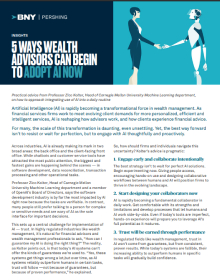September 10, 2025
Practical advice from Professor Zico Kolter, Head of Carnegie Mellon University Machine Learning department, on how to approach integrating use of AI into a daily routine
Artificial Intelligence (AI) is rapidly becoming a transformational force in wealth management. As financial services firms work to meet evolving client demands for more personalized, efficient and intelligent services, AI is reshaping how advisors work, and how clients experience financial advice.
For many, the scale of this transformation is daunting, even unsettling. Yet, the best way forward isn’t to resist or wait for perfection, but to engage with AI thoughtfully and proactively.
Across industries, AI is already making its mark in two broad areas: the back office and the client-facing front office. While chatbots and customer service tools have attracted the most public attention, the biggest and fastest gains are happening behind the scenes — in software development, data reconciliation, transaction processing and other operational tasks.
Professor Zico Kolter, Head of Carnegie Mellon University Machine Learning department and a member of OpenAI’s Board of Directors, says the software development industry is by far the most impacted by AI right now because the tasks are verifiable. In contrast, many people still prefer talking to a person for complex or sensitive needs and are wary of AI as the sole interface for important decisions.
This sets up a central challenge for implementation of AI — trust. In highly regulated industries like wealth management, it’s natural for financial advisors and wealth management professionals to ask, “How can I guarantee my AI is doing the right thing?” The reality, as Kolter points out, is that today’s AI systems can’t offer the kinds of guarantees we’re used to. “Yes, these systems get things wrong a lot,but over time, as AI systems reliably outperform humans in certain tasks, trust will follow —not because of guarantees, but because of proven performance,” he explained.
So, how should firms and individuals navigate this uncertainty? Kolter’s advice is pragmatic:
1. Engage early and collaborate intentionally
The best strategy isn't to wait for perfect AI solutions. Begin experimenting now. Giving people access, encouraging hands-on use and designing collaborative workflows between humans and AI will position firms to thrive in the evolving landscape.
2. Start designing your collaborators now
AI is rapidly becoming a fundamental collaborator in daily work. Get comfortable with its strengths and limitations and develop processes that let humans and AI work side-by-side. Even if today’s tools are imperfect, hands-on experience will prepare you to leverage AI’s full potential as it matures.
3. Trust will be earned through performance
In regulated fields like wealth management, trust in AI won’t come from guarantees, but from consistent, proven results. While today's systems are fallible, their increasing ability to outperform humans in specific tasks will gradually build confidence.
4. Real world impact is already underway
AI is having its greatest and fastest impact in operational roles, especially software development, where tasks are verifiable and measurable. Back-office automation is advancing rapidly, even while many users remain cautious about AI in client-facing roles.
5. AI is a discovery, not an invention
Rather than a traditional engineered tool, AI should be understood as a scientific discovery — an emergent form of intelligence born from scaling up predictive systems. Its coherence and capability go far beyond what one would expect from mere next-word prediction.
The pace and scale of change may be intimidating, but the most resilient organizations and individuals will be those willing to learn, adapt and collaborate with AI — turning uncertainty into an advantage.

5 Ways Wealth Advisors Can Begin to Adopt AI Now
This article is based on a panel discussion from BNY INSITE 2025, entitled " The Rise of AI: AI’s Impact for Intelligent Wealth " Watch the replay here: https://www.bny.com/pershing/us/en/about/events.html
Related Content
Ask how we can help transform your business




